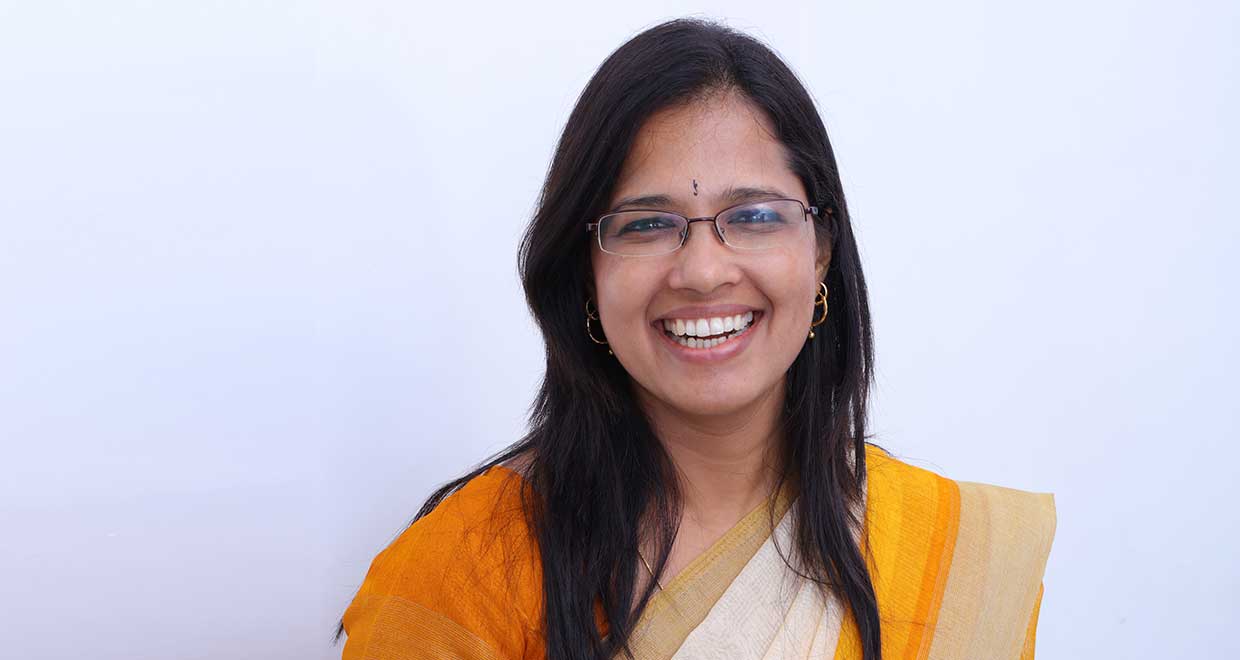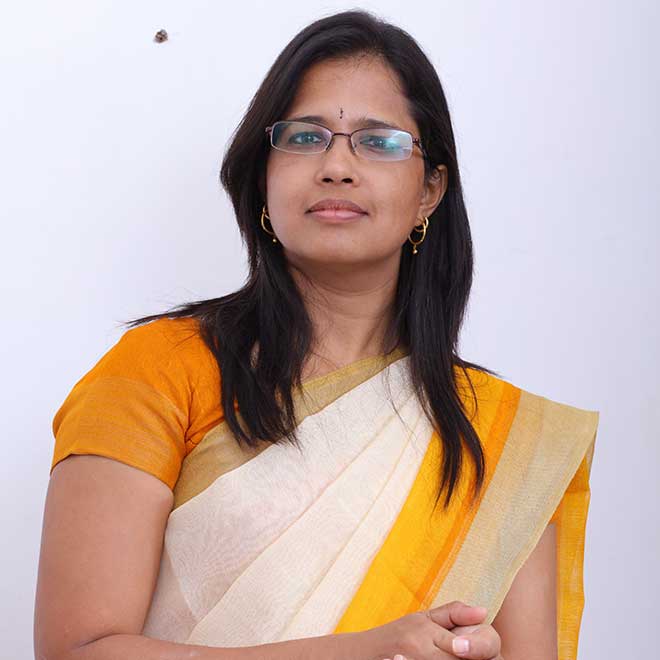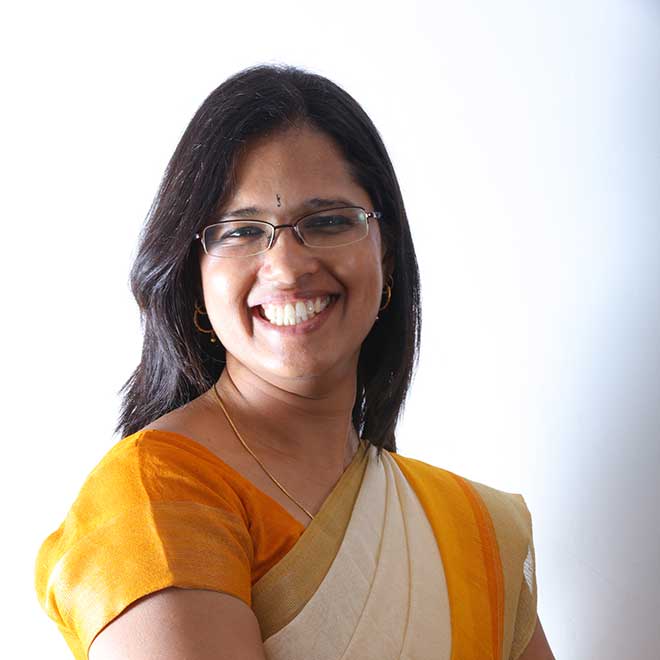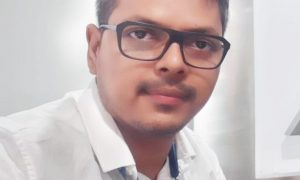Swapna graduated from Tamil Nadu Doctor Ambedkar Law University, in 2000. She then went on to pursue her Masters from Brussels School of International Studies, University of Kent, in 2002. She is presently the Principal strategist and CEO at IP DOME – IP Strategy Advisors. She co-founded the company with partner, Mr. Raghavendra Ravi, a CEO coach, consultant and expert at operations and supply chain. She has also been teaching European and US patent law at the NALSAR PG diploma course on Patent Laws, in addition to giving guest lectures at different institutions, including the Asian College of Journalism (ACJ), Symbiosis Law School, Vellore Institute of Technology (VIT), IIT-M and Anna University. She also sits on the IP Advisory Committee of the Tamil Nadu Technology Development and Promotion Centre (TNTDPC), an autonomous not-for-profit society of the Government of Tamil Nadu and Confederation of Indian Industry (CII). The TNTDPC helps formulate policies to guide use and protection of IPR in Tamil Nadu.
In this interview we speak to her about:
- Starting her own company
- Her experience in IPR
- Her teaching experience
Can you tell our readers about your firm?
At IP DOME, we work with corporates, MSMEs, research institutions and individual inventors to take their inventions and creations of the mind – books, illustrations, musical works – to the market. We are a multi-disciplinary team, with Hariprasad – a hardware engineer heading operations, Dhanya – a biotechnologist heading analysis, Karthick handling Business Administration, and Prashant – an electronics engineer spearheading market expansion. In addition to being an excellent supply chain expert, Mr. Raghavendra Ravi is a formidable chemist with more than a cursory interest in perfumes and oil. Clients get to meet experts from their area of interest even at the first meeting, besides meeting me or other lawyers at the firm. Therefore, my work at IP DOME is extremely interesting and I look forward to rewarding discussions and new challenges every day. In the past ten years, we have also learnt how to leverage the opportunities afforded by the bustling Indian market. I am happy to say that our Toolkit for the UK IP Office ‘The IP Smart Approach to Doing Business in India’ has earned us a place as strategic partners of the UK Institute of Exporters’ Doing Business in India Guide.
What was it that got you interested in the legal field? Do you come from a family of lawyers?
No, I don’t come from a family of lawyers. My father was a Lieutenant Colonel in the Army. My uncle was a respected public prosecutor at Vellore, but by the time I became a lawyer, he was already semi-retired. I think my interest in law came from my desire to work with people, and I found the logical process of thought required to build arguments fascinating. I do research and teach credit courses on technology law, and then interface between technology and rights.
Did you participate in extracurricular activities such as moots, debates, etc. in law school?
I did participate in a couple of moots while at the Madras Law College, but I did not find it very exciting. I have participated in debates while at the Madras Christian College, where I pursued my Bachelor’s degree. I started working in a legal firm from my first year after college hours. I found that very rewarding. I had the opportunity to support a protest by farmers opposing shrimp cultivation, which was destroying the land through inundation of sea water. My task as a (trainee) lawyer was to ensure that the protestors – mostly women and children – were not harmed. Eventually, they were taken to a school where they were made to wait till remand. I took the opportunity to ensure they got water and food, and also taught them a preliminary class on Article 21. Interestingly, the arresting policemen participated avidly in the discussions, pointing out that their human rights were being violated by long hours of ‘bandobast’ duty and unpaid overtime!
Later, when I was studying for my ML in International Law with International Relations, I worked, as a paralegal, with Monsieur Nicolas Angelet, a lawyer specialising in refugee rights. The cross-cultural work provided me with insights into European governance models, history and notions of nationhood, that I may otherwise not have learnt.
What was your first job after law school?
My first job was that of a junior lawyer, in the very firm where I had interned. I suppose they liked my work and found me competent.
Can you tell us about being a teaching assistant at the University of Kent where you deliver lectures on British constitutional law and British Human Rights law?
I studied for my ML at the Brussels School of International Studies (BSIS), which is the European School of the University of Kent at Canterbury. My professor Dr. Wade Mansell, liked my papers on International Relations, where I had explored constitutionalism and colonialism, and how many of the most volatile regions of the earth had been distressed colonies. My papers on the TRIPs agreement were also appreciated. The University of Kent offered me a seat for Ph.D. and a teaching assistantship to help pay the tuition.
Constitutional law in the books, and Constitutional law on the streets, or in the courts mean different things to different people. UK has no written Constitution; it is derived from many different sources. My background as a lawyer, and my interest in Constitutional law were advantages, since they were looking for someone with practical experience. The British Human Rights Act had been promulgated only in 1998, and not many people were familiar with it. I had an interesting experience giving a lecture on the Act to the Metropolitan Transport Police. They subsequently wrote a very good feedback about my lecture.
What got you interested in the field of intellectual property?
Mr. Kamath of Kamath & Kamath strongly recommended that I should register as a Patent attorney and I thank him for that. A patent agent drafts and files the patent application on behalf of the inventor, or the applicant. The role of the patent agent is to capture the invention in its technological brilliance, and fence it with appropriate legal mechanisms. The claims are the most important part of the patent application, although it forms, in general, about 10-15% of the content of the application. Today, my work is largely strategic. I work with our patent engineers and illustrators to communicate a strategic agenda to the application being filed, bringing to it market insights, technology trends and international strategy.
My exposure to International Economic Law and the macro-economic scene relating to technological advancement, market share, banking and the global development agenda were crucial factors in driving my attention and interest towards IPR. The WIPO course on IP strategy that strengthened my understanding of the connections between Intellectual Property resources, competitive advantage and sustainable growth. It is very interesting to keep track of changes at local and global levels in areas of economics and market, and the volatility keeps us on our toes.
What caused you to leave teaching and take up a job at a law firm?
It was always my intention to work. Giving lectures in new and emerging areas is interesting, but I don’t have to grade papers, or guide research. I admire the dedication of law professors, who not only prepare interesting lectures for students, grade papers, and advise on reports, they also find time for their own research and publications, while supporting the institution. I don’t think I could have done it.
You are currently the CEO of IP Dome Strategy Advisors. What is the nature of your work?
As CEO, my job is more administrative than legal. I put out the fires, manage the resources, oversee the operations (without stepping on the toes of competent colleagues), and act as a point of communication between the directors and corporate operations. As a small organisation IP DOME also depends (largely) on me to provide brand visibility, develop markets, reach out to senior associates in India and overseas, and provide expansion plans. As we look to expand into Singapore and USA in the near future, I am also expected to drive the project.
India is a net importer of technology. I don’t see this changing in the next decade or two. The role of the IP lawyer in India will not remain focused on inventors and research institutions. The IP lawyer or IP firm will have to evolve into market specific entities with wide ranging capabilities, including negotiation, contract management, statistical modelling, data analysis and data management.
What advice would you give those of our readers who want to pursue a career in the filed of intellectual property?
It is interesting to note that while young lawyers are interested in IPR, not many are interested in science and technology, or mathematics. I suppose that is why they became lawyers in the first place! We are always looking for whip smart lawyers who are also good in scientific disciplines. Going forward, I foresee a good demand for lawyers with knowledge of science and market or economics and statistics. As the field evolves in India, it would be important to keep track of the changes in IP law and IP regimes across the globe.
Engineers talk differently from lawyers; biotechnologists and medical professionals use jargon that is incomprehensible to us. Data analysts have a different perspective on an course which we are contemplating. You would be benefited if you learn how to work with people from different scientific disciplines. When contributing your skills or ideas to people from other domains, it helps to be familiar with the jargon or terminology of their discipline. I would also advise learning to read and interpret graphs, trend charts and data models.
What is your opinion about the importance or necessity of higher education?
ML at BSIS provided me with an understanding of the market as a powerful agency of amorphous actors, which is nevertheless organised and well-structured. This perspective lends me the ability to identify and re-orient tactically to economic transitions. Higher education, according to me, should enhance competency or skills in a chosen area of work or interest. A lawyer who studies for Master’s with basic knowledge of law supplemented with practical experience, stands to gain the ability to define her role more finely, and align herself with market requirements. Higher education must either drive better understanding of the domain of operations, or help the lawyer to reach professional goals. Choose wisely, both on the basis of what you want to study, and where to study.
You are a part of the Ethics committees of various institutions. What does this position entail and what kind of matters do you have to deal with?
I am a member (legal) of the Institutional Human Ethics Committee of the National Institute of Epidemiology, an ICMR body, and a member (legal) of the Ethics Committees of IIT-M, SRM Medical College and Hospital, the National Institute of Siddha and the SRM Institute of Medical Sciences. An ethics committee is an independent body consisting of healthcare professionals and non-medical members, whose responsibility is to protect the rights, safety and wellbeing of human subjects involved in a clinical trial and to provide public assurance of that protection. As member (legal) I keep track of whether the research protocol ensures that the rights of the patients are not violated; at the same time, I also see that the rights of the researcher to conduct research on human participants is not unreasonably curtailed. The other members of the committees look to the lawyers on the committee to ensure that laws are not violated, and that institutions, researchers, contract research organisations and sponsors of trials do not avoid their obligations. We study and comment on the trial protocol, suitability of investigators, adequacy of facilities, significance of number of participants, compensation, consent and waivers, reporting on adverse events and termination of trials.
What are the measure we should be taking to empower women further?
In general, we can empower women by promoting gender balance in recruitment and promotions, and by driving a culture of diversity. In India, this includes people from different communities, as well as different states. It is important to realise that if Indian companies fail to recruit and retain talented women, they will only exacerbate the acute shortage of competent personnel. It is necessary to support women by encouraging conversations around gender equity and professional goals in a co-working situation. Women feel valued when their self-assessment of technical competencies, and professional relationships meet and align with the organisation’s assessment of them. An organisation that values its women, promotes a culture that encourages openness, accessibility, collaboration and community, allowing women to contribute with greater confidence. Empowerment also means promoting women to positions of leadership and decision-making.
At IP DOME, we strive to empower all team members by encouraging a focus on health and wellness, both mentally and physically. We aim to create a workspace and culture that empowers and inspires members to achieve professional excellence. Whether men or women, we encourage team members to ‘be yourself’. This promotes a transparent and balanced company culture. Having a family should not deter either men or women from pursuing a fulfilling career; this means we are prepared to enable flexibility in work schedules and help with education expenses. As a woman CEO, I tell women colleagues to develop a stronger political self, questioning the straitjackets that society may insist on. They should be able to think and act as competent professionals and leaders.
Do you think law school prepares students for real world challenges?
The purpose of law schools is to prepare students to pass the Bar Exam and to be responsible and ethical members of the legal fraternity. But I would not say that they are sufficiently prepared for a successful career in law, when they graduate. While a graduate from a good school may meet the knowledge and competency criteria, other crucial skills will have to be learnt from school activities that students participate in, or the internships they take up. Important skills include case management, communications, non-electronic research, drafting, analysis of law and facts, strategies for resolution, and a whole host of client management issues including evaluating potential client engagement, maintaining client trust, arriving at budget and terminating client relationship. In addition, account management, interpersonal skills and working collaboratively – challenges in working any industry, will also have to be learnt by the new graduate.
I believe that graduates who allocate sufficient time to planning their careers, and understanding their capacities and competencies stand a good chance of succeeding in their chosen profession. The planning should be a combination of vision and intense, detailed planning. There is one quality that appears to differentiate a successful lawyer from the rest – the ability to be tactically flexible in achieving a strategic goal!
What are the challenges you have faced in building your career as it stands today?
IP DOME entered the market with a clear strategy to promote IP Strategy in India. India’s unique ecosystem – high growth coupled with infrastructural inefficiencies and delays in bureaucracy and judiciary, and the large cost of controlling infringement by many small and micro-unites – call for special measures and strategies. In the last 10 years, we have earned a reputation for strategic IP services. In fact, the UK IP Office commissioned us to write a Toolkit: IP Smart approach to doing business in India, which is available for free download on our website, which has received good feedback.
The challenges have been in terms of maintaining focus on our core expertise, developing and nurturing a strong network and attracting top talent. Yet another challenge is enabling and encouraging visibility and recognition for our subject matter experts, as many fora recognise only me as a resource person! Brand building requires considerable investment in terms of time and resources from the company as well as the team members, and as we provide highly specialised services, we also invest in education and awareness campaigns in colleges, schools, SME and entrepreneurship development institutes, self-help groups and industry bodies. The experience has taught me that deriving value from IP in India requires tactical planning and strategic deployment of resources from the time of conception of an idea to the launching of it in the market.
How do you maintain a work- life balance?
Personally, my method is to apply my mind to many different projects simultaneously; my second book on the Marina pro-Jallikattu Protest – Occupy Marina! will be released in September. I believe that in a balanced life, we must accord equal priority to family, career and other interests that make us who we are. There are a few well-recognised means of ensuring a good work-life balance for the team. The following have worked well for us:
- We know we are running a marathon, not a sprint. Endurance as a team is more important than a short burst of speed resulting in burn outs, frustration and high stress levels.
- We know we are human, and have limitations. Sleep deprivation, high stress levels, no time to decompress, irregular hours – all these result in less than optimum health. We prefer productive hours to long hours.
- Delegation and redistribution. In a sense, we communicate that no one team member is indispensable. This helps us to let people off to take care of family or health matters. When work is distributed evenly, the team feels less burdened, and friendlier towards each other.
- Take the help of an organisational consultant. Our organisational consultants, Dr. T.T. Srinath and his colleague, Mr. Sadasivan, encourage a balanced outlook to life, and ensure that we are constantly aware of our current state of stress as individuals, and as members of a team.
What advice do you have for our readers who are primarily college students?
OK, here goes: Don’t watch TV. There are other ways to keep yourself informed, and a million things happening around you that will provide you with meaningful entertainment, future visions, opportunities and choices. Don’t get hooked to social media. You will only keep hearing what you like; social media channels, use filters to amplify what you respond to, and filter out what you don’t like. Keep track of trends, but don’t be too quick to specialise. If you have interests in areas like science or fine arts, now is the time to explore. After ensuring good grades, spend more time building relationships. Great marks won’t help you in practice, friends and seniors will. Your free time would be excellently spent if you read a few books, among them, 1984 (George Orwell), The Trial (Franz Kafka), The Social Contract (Jean-Jacques Rousseau), The Handmaid’s Tale (Margaret Atwood), History Will Absolve Me (Fidel Castro), My Name is Red (Orhan Pamuk), Serious Men (Manu Joseph), India after Gandhi (Ramachandra Guha), Clarence Darrow for the Defence (Irving Stone), Midnight’s Children (Salman Rushdie) and One Hundred Years of Solitude (Gabriel Garcia Marquez) – in no particular order.



























Pingback: Hear it from the IP lawyers in the industry - Lawsikho Blog